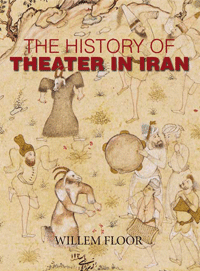 The
promised land The
promised land
Zarrin writes against America
the Third Reich and for Whitman's democratic
vision in some of the most beautiful language to praise his chosen
country
Dean Brink
July 20, 2005
iranian.com
Review
The Book of I
By Ali Zarrin
City Lights, San Francisco, an eBroadside Publication, July 2005
I had the pleasure of attending a reading of Ali Zarrin’s
The
Book of I last year. Everyone there was visibly moved
and many spontaneously gathered around the poet after his powerful
performance.
His poetry is about an immigrant who came with a dream to be American
and love America, and who now more than ever questions whether
this is possible; this drama forms the underlying sweetness in
his poetry -- a naïve ideal underscoring the irony of living
in a world in which America continues to be an imperialist nation
bent on forcing its consumerist needs on others, even if it means
invading his own homeland, Iran.
In this ironic relationship with
America, Zarrin, as an American, charmingly creates intimacy and
respect between himself and readers by simply relating his experiences,
which are undeniable and from the heart. His poetry quite refreshingly
abstains from the current convention of taking pleasure in merely
the controlled entanglement of words in neurotic play. Here is
Whitman’s poetry for the people in an era in which the majority
of Americans do not want a Whitman, and in which democracy itself
has become a euphemism for compliance and the establishment of
puppet regimes.
Zarrin writes to America, "I want to talk to you ... I
want to open my heart to you / I want to give you my heart, a small
gift from a Persian poet who became American." Along the lines
of Ginsberg he employs hyperbole in assessing how we have dreamed
of "America," which is both personified and addressed
in an appeal to all Americans to hear his story. Yet Ginsberg depended
on a scatological rhetoric of shocking his audience (then unaccustomed
to openly gay and Jewish men) and then needed to sustain the alienation
of himself as incorrigible freak and his audience as a caricature
of another sort, the middle class heterosexual.
Zarrin, being born
in Iran and coming to America in his late teens, on the other hand,
entrenches himself in the very dream of attaining a modicum of "ordinariness" in
being "American." This drama forms both the underlying
sweetness in his poetry and the ironic relationship with an ideal
that is impossible given the reality of life in the U.S., which
can only be seen as such by those of us who maintain ties with
cultures and histories outside mainstream America. Zarrin recreates
an intimacy and respect between people that has been done away
with in the age of one-liner sound bytes, media hype and “shock
jocks.”
 As an immigrant he is enabled to see freshly and to reaffirm
the details of his observations in the grand rhythms of Rumi and
other Persian poetry, which he also writes and translates into
English. This approach is part of a critique of a land in which
so many people lazily see the world through stereotypes that are
unfriendly to Iranians and others from the Middle East. As an immigrant he is enabled to see freshly and to reaffirm
the details of his observations in the grand rhythms of Rumi and
other Persian poetry, which he also writes and translates into
English. This approach is part of a critique of a land in which
so many people lazily see the world through stereotypes that are
unfriendly to Iranians and others from the Middle East.
Adding to the irony: not only does Iran have a long history of
being exploited for its oil and textiles by England and America,
but that it more recently, after the liberation from American domination
in the Revolution that turned from a progressive movement to a
religious one, in the 80s, fought a war with Iraq -- Arabs -- so
that the ideological and emotional complexities of being both an
American citizen raised in Iran might have been expressed in complex,
treatise-like labyrinthine epic. Yet Zarrin appears committed to
a poetry that resists academic audiences and, as in Iran, where
poets have rock-star status, finds his voice in a public idiom
that moves people.
The long poem is a response both to Lawrence Ferlinghetti, who
suggested Zarrin introduce more of the "I" in his poetry,
and to his bold and optimistic Made You Mine, America, written
during the Clinton years. It is another long poem, but which works
through personal and historical problems encountered with America
to climax in a bittersweet affirmation of both his life and the
nation, with only minor reservations.
The new poem, The
Book of I or BOI, plays up the humility of the "I" even
more, dragging us through countless examples of small tragedies
and a desire to
feel
he belongs in America; he asks, "Is this my land? Will I die
happy in America? / Will my ashes find a home in America?" It
is an issue many of us struggle with today, as I write this review
from Taipei and see America as existing in the past, no longer
a country I can even recognize, so complete has the corporate takeover
been, so either profoundly ignorant or mean spirited have Americans
become, accepting the rhetoric of empire.
Zarrin's poetry rings true out of the very basic kernel of desire
to make meaning of his life. How this voice works, often in rhythmic
prose, contra the braggadocio of Ginsberg's "endless balls," is
by being ordinary while being anything but boring: the very desire
to belong is so moving to see, so totally out of the media loop
of one-liners and stereotypes, where people fill in for real people
in their roles, and all others fly under the radar, ignored. Zarrin
in his directness goes on to address real issues and expresses
resistance to the ways things are presented in corporate media,
which has become a mouthpiece for elected officials:
America,
Beware! They brainwash you 24/7, 30/365--a lifetime!
I am not a terrorist--I wouldn't even kill an ant or a bird--
my great-grandfather poet Ferdowsi said:
"Don't hurt an ant that is carrying a seed home."
 One might write this off as old-fashioned, so very modernist --
to have a consciousness to be brainwashed! Now is an age of shopping
nationalism, formally inaugurated after 911, with the implication
of “leave the driving to us” in the administration’s
statements. Zarrin has simply jettisoned the fashionably bourgeois
(or postmodern) neurotic avoidance of ever arriving and being grounded.
The milieu he depicts is anchored in personal and public history,
showing how these are not as distinct as one would be led to believe
seeing the televised pageantry of middle class "self-determination." One might write this off as old-fashioned, so very modernist --
to have a consciousness to be brainwashed! Now is an age of shopping
nationalism, formally inaugurated after 911, with the implication
of “leave the driving to us” in the administration’s
statements. Zarrin has simply jettisoned the fashionably bourgeois
(or postmodern) neurotic avoidance of ever arriving and being grounded.
The milieu he depicts is anchored in personal and public history,
showing how these are not as distinct as one would be led to believe
seeing the televised pageantry of middle class "self-determination."
Zarrin's work reminds me of what Slavoj Zizek calls "the infinite
task of translation, a constant reworking of one's own particular
position" as a form of resistance: resistance by simple refusing
the clichés of our mediated lives and the use, for instance,
of "universal" human rights so as to justify an omniscient,
privileged perspective while avoiding the required work that talking
about other cultures and understanding their histories requires.
(1)
This poem is about what have been called "culture wars," which
is really a battle for the control of capital flows. The corporations
today that profit from our massive gift of taxes are those entrenched
in the military-industrial-Congressional-media complex, and they
happen to benefit from right-wing religions such as fundamentalist
Christians who are always willing, given the magic word, to follow
a leader into war.
Yet it is conceivable that if environmental
industries became big enough business (perhaps overseas first)
they themselves might co-opt the ascendancy of military and oil
industries and the will of the people. The whole idea of American
as the Promised Land currently fueling American infallibility
and militaristic nationalism could be channeled into a perhaps
belated
attempt at environmentalist nationalism. In this utopian vein
Zarrin writes against America the Third Reich and for Whitman's
democratic
vision in some of the most beautiful language to praise his chosen
country:
America is an idea, a bright place on the map of imagination,
it's somewhere that illuminates the mind when the meaning of
home darkens in your head.
 Yet in this age of a single unchallenged and assuming superpower,
he appropriately chastises America, writing, Yet in this age of a single unchallenged and assuming superpower,
he appropriately chastises America, writing,
Cast aside your bigotry America! Stop your aggression!
Your invasion of other lands under the name of liberty!
Quit making every one white!
Making everyone in the world think
like you!
Zarrin puts his very interesting life and natural sense of history
that flows from his experiences before the formal rhetoric of “being
balanced,” a positioning that pretends to have no position
and which has led so much poetry into a fatiguing rhythm of confabulating
much ado over minor complaints. He does not edit out what needs
to be said, and as such this poetry will outlive poets who simply
write the way one is supposed to write American poetry today, following
the example, for instance, of the equivocating former poet laureate
Robert Pinsky, who cannot even state an opinion on the invasion
of Iraq to questioning undergraduates. (2)
About
Dean Brisk is Assistant Professor and Chair, Japanese Studies
Minor. Saint Martin’s
College, Lacey, Washington. See homepage.
Notes
1- See Slavoj Zizek, Welcome to the Desert of the Real! -- Five
Essays on September 11 and Related Dates, London: Verso, 2002,
66.
2- Robert Pinsky, during Q&A at a reading at the University
of Puget Sound, Tacoma, Washington, Spring, 2004.
|